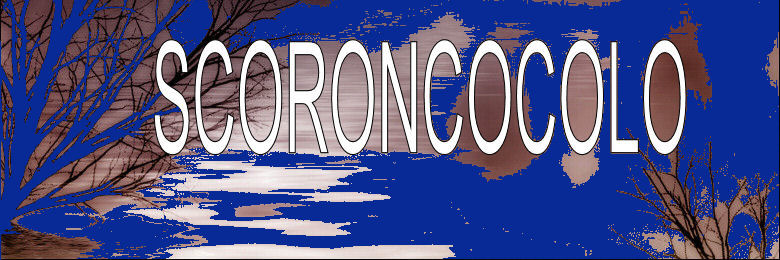THE SCORONCOCOLO BEERPAGE
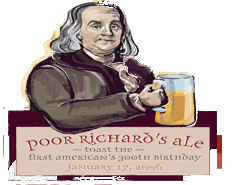
Beer is proof that God loves us and wants us to be happy. ------- Benjamin Franklin
BEER IN ANCIENT TIMES
The history of Beer is as old as History itself. There are recipes for brewing beer carved on Babylonian clay tablets dating back to 4300 BC. It stands to reason that we homo sapiens learned the magic of making beer long before we bothered to jot the recipe for it down in stone or jot much of anything else down on stone, for that matter.
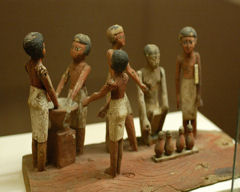
Assyrians and Egyptians began brewing beer at about the some time that the Babylonians did. So beer is older than recorded history. Who knows, beer may have been the very muse that inspired mankind's first writers, those carvers of San-skrit and hieroglyphics in stone, as it has inspired our modern day Hemingways, Dashill Hammetts, John Cheevers, Malcolm Lowrys and the like.
Much later the Egyptians passed their knowledge of the art of brewing on to the Greeks who weren't very much impressed, wine having entrenched itself for centuries in their collective conscience. But the Greeks, being the purveyors of all knowledge that they were, began to experiment with brewing and probably made some improvements to the process.
When the Romans conquered the Greeks around 200 BC, the art of brewing beer grew westward. The Romans, at least the upper-class, didn't think much more of this new method of fermentation than the Greeks did until they realized that they could brew beer cheaper than they could wine and the servants and slaves actually seemed to like the stuff.
Julius Caesar took brewers with him when he set off to conquer Gaul in 58 BC. His troops were kept pacified with rations of Beer as that was far easier to manufacture on the fly than wine. And the art of brewing Beer spread into what would become Europe. Of course, the idea of Caesar blithely traipsing northward planting the knowledge of brewing in the fertile minds of thirsty Celts as a sort of Johnny Appleseed of Beer is an unrealistic view of events. Caesar was much more interested in murder, mayhem, rape, pillage and utter subjugation. Pint for pint, there was no doubt about as much blood spilled as Beer brewed during the Romans adventures in Gaul.
Nevertheless, the Romans arrived in Britain in 55 BC. And that is the date that marks the beginning of the Brits long love affair with their pint 'o Bitter.
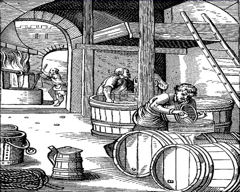
BEER IN THE MIDDLE AGES
Toward the end of the first millennium Catholic monasteries all over Europe, but particularly in the north, became very industrious brewers of Beer. There were a number of reasons for this. By brewing Beer within the confines of their monasteries, the monks could have complete control over the ingredients used to make the Beer they consumed. During these early days of brewing, before anyone thought to use hops to flavor and preserve Beer, all sorts of herbs and spices were being experimented with.
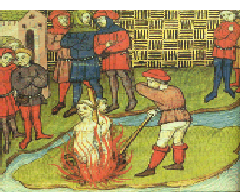 Some like wormwood and henbane could cause hallucinations or worse. And too, things often went wrong with brewing, especially among the unchurched masses. When that happened many people got sick and died and a scapegoat was needed to explain what had gone wrong. No one really knows how many Beer Witches were burned. Today we would hold the brewer of the Beer accountable if his product was found to be lethal. But in those suppositious days only a Beer Witch could have been at fault.
Some like wormwood and henbane could cause hallucinations or worse. And too, things often went wrong with brewing, especially among the unchurched masses. When that happened many people got sick and died and a scapegoat was needed to explain what had gone wrong. No one really knows how many Beer Witches were burned. Today we would hold the brewer of the Beer accountable if his product was found to be lethal. But in those suppositious days only a Beer Witch could have been at fault.
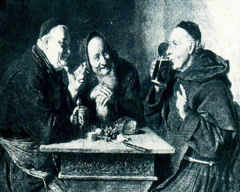 Brewing Beer in the monasteries using reasonable sanitary methods meant that fewer witches had to be burned. Another reason the monks had for brewing their own Beer was that it was highly profitable. Even when royal and city breweries began to flourish in the tenth and eleventh centuries, the best beer was still made in monasteries. Monastery pubs sprouted up all over Europe. In the eleventh century there were 400-500 monasteries brewing in Germany alone, all making a healthy profit on their high quality beer. But perhaps the best reason for monasteries brewing their own Beer was that those monks drank a lot of Beer. According to Church archives the average monk was allowed 5 liters or about 5 and a half quarts of Beer per day! And that's on top of the wine that was often served at mealtimes.
Brewing Beer in the monasteries using reasonable sanitary methods meant that fewer witches had to be burned. Another reason the monks had for brewing their own Beer was that it was highly profitable. Even when royal and city breweries began to flourish in the tenth and eleventh centuries, the best beer was still made in monasteries. Monastery pubs sprouted up all over Europe. In the eleventh century there were 400-500 monasteries brewing in Germany alone, all making a healthy profit on their high quality beer. But perhaps the best reason for monasteries brewing their own Beer was that those monks drank a lot of Beer. According to Church archives the average monk was allowed 5 liters or about 5 and a half quarts of Beer per day! And that's on top of the wine that was often served at mealtimes.
Liquid Bread
It wasn?t just monks who were drinking heavily. Men, women and even children in every social stratum in the Middle Ages consumed far much more alcohol than we do today. If you think about it what else was there to drink but Beer. Wine was too expensive for commoners, no one had ever heard of coffee or tea, sodas and colas were centuries away from being thought of and drinking water was down-right dangerous and often fatal especially in well congregated places where raw sewage ran in gutters down both sides of every city street.
You might think: well, all they had to do was boil the water before they drank it. But, no one ever imagined that there were millions of different types of tiny, nasty, dangerous creatures living in a glass of water that were far too small to be seen. Our ancestors in the Middle Ages firmly believed that the only things that couldn't be sensed were spiritual in nature. All they knew was what had been handed down to them from generation to generation for hundreds of years and that was that Beer was far more safe to drink than water. Of course, the very first procedure in every formula for brewing Beer is "Bring a large amount of water to a rapid boil".
When the Pilgrims pulled the Mayflower into Plymouth Harbour on December 16, 1620, one of their main reasons for stopping was that they had run out of beer. "We could not now take time for further searche or consideration: our victuals being much spente, especially our beere," the captain recorded in the the ship's log.
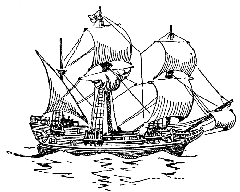
Since it is easy to make Beer with anything that can be used to make bread, the early English settlers of North America began immediately brewing Beer with maize as it was more readily available than barley. But for the most part they relied on imported English beer. These early Beers were all ales produced by top-fermenting yeast, like the Beers still being brewed in England today as opposed to bottom-fermenting yeast that produce lager style Beer of German origin. (For more information about different types of Beers and Ales go to ScoroncocoloBeerPageTwo.)
In the 1840's a huge wave of German immigration began and with it came such giants of Beer brewing history as Frederick Pabst, Bernard Stroh, Joseph Schlitz, Adolph Coors, Theodore Hamm and Eberhard Anheuser. These men were true German brewmisters and they revolutionized the brewing of Beer in America. Budweiser and Michelob, Coors, Millers and almost all mass produced Beers in America today are German style lagers as apposed to English style Ales.
In 1875 there were well over 4000 breweries in the US. But soon after the numbers began to shrink as larger companies began to buy up smaller ones and then in 1920 Prohibition was enacted and sadly all American breweries were forced out of business. Of course this silly act of Congress couldn't and didn't stop America's desire for Beer. It only caused the price for Beer to skyrocket astronomically. In 1933 President Roosevelt convinced the Congress to repeal the Volstead Act and Prohibition mercifully came to an end. Sadly, only 750 breweries out of the four thousand or more were able to restart production.
In the 1980's several states began passing legislation that allowed microbreweries to set up operation. And so began another revolution in the brewing of Beer's history.
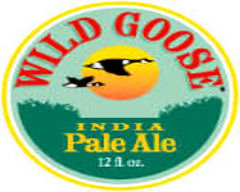 Small commercial craft brewers began experimenting with English style Ales and particularly India Pale Ales, commonly called IPAs, using top-fermenting yeast. (For more information about different types of Beers and Ales go to ScoroncocoloBeerPageTwo.) India Pale Ales are very stout and contain a lot of hops. The first IPAs were created long ago by British brewers as a means to brew a Beer strong enough to survive the long voyages aboard ships bound from England to the British colonies and particularly India. It became so popular that it almost overshadowed every other style the Brits were brewing for consumption at home.Today some of the finest IPAs are brewed in the United States.
Small commercial craft brewers began experimenting with English style Ales and particularly India Pale Ales, commonly called IPAs, using top-fermenting yeast. (For more information about different types of Beers and Ales go to ScoroncocoloBeerPageTwo.) India Pale Ales are very stout and contain a lot of hops. The first IPAs were created long ago by British brewers as a means to brew a Beer strong enough to survive the long voyages aboard ships bound from England to the British colonies and particularly India. It became so popular that it almost overshadowed every other style the Brits were brewing for consumption at home.Today some of the finest IPAs are brewed in the United States.
George Washington's Recipe for Beer
George Washington was a devout beer lover and an industrious brewer. In particular, he was fond of the dark, English-style brew known as porter, and always demanded that an ample supply of it be kept on hand at Mount Vernon, his Virginia estate. However, it was not porter, but rather "small beer," for which Washington once recorded an early recipe. Preserved in the manuscript collections of the New York Public Library is a notebook kept by Washington, which includes the following hand-written recipe.
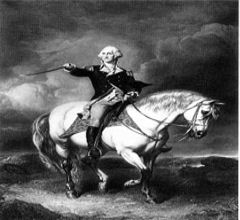
"To Make Small Beer Take a large Siffer [Sifter] full of Bran Hops to your Taste. -- Boil these 3 hours then strain out 30 Gall[ons] into a cooler put in 3 Gall[ons] Molasses while the Beer is Scalding hot or rather draw the Melasses into the cooler & St[r]ain the Beer on it while boiling Hot. let this stand till it is little more than Blood warm then put in a quart of Yea[s]t if the Weather is very Cold cover it over with a Blank[et] & let it Work in the Cooler 24 hours then put it into the Cask -- leave the bung open till it is almost don[e] Working -- Bottle it that day Week it was Brewed."
Percentage of Alcohol in Various Brands of Beer
- Anchor Steam - 4.9 Anchor Small - 3.3
- Budweiser - 5.0 Bud Lite - 4.2
- Busch-4.6 Busch lite - 4.2
- Coors - 5.0 Coors Lite - 4.2
- Miller High Life - 5.5 Miller Lite - 4.2
- Heineken - 5.4 Heineken Lite - 4.2
- Michelob - 5.0 Michelob Lite - 4.3
- Beck's - 5.0 Beck's Lite - N/A
- Bell's/Kalamazoo Third Coast Old Ale -10.2
- New Belgium Trippel -7.8
![]() Scoroncocolo Inc 2007-2008
Scoroncocolo Inc 2007-2008
 blog comments powered by Disqus
blog comments powered by Disqus
